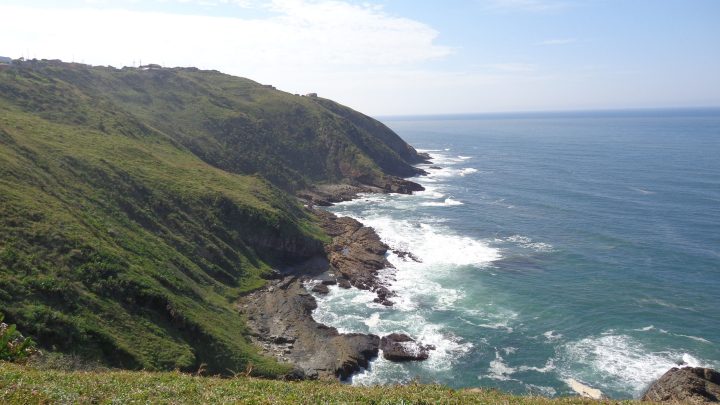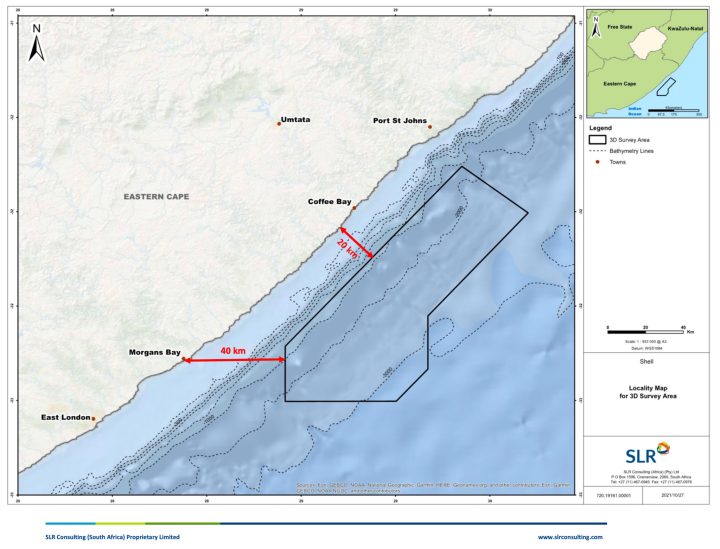OFFSHORE EXPLORATION
Activists petition to stop Shell’s planned seismic survey in seas off Eastern Cape

Activists say the survey, to search for oil and gas, will disrupt and threaten marine life, and adversely affect fishing communities in the area.
Marine activists in the Eastern Cape have voiced their anger after Shell announced that it will start a three-dimensional seismic survey in search of oil and gas deposits from Morgan Bay to Port St Johns starting on December 1.
Shell has appointed Shearwater GeoServices to conduct the survey, which will last from four to five months and cover 6,011km² of ocean surface. The survey area is located more than 20km from the coast, with its closest point in water depths ranging between 700m and 3km.
In an attempt to stop the survey, the Oceans Not Oil coalition has launched a petition to the Environment, Forestry and Fisheries Minister Barbara Creecy, calling for her to withdraw the approval of the application.
The petition had close to 13,000 signatures on Tuesday.
Oceans Not Oil founder Janet Solomon said many sea creatures could be affected by the survey.
“At a time when world leaders are making promises and decisions to step away from fossil fuels because climate science has shown we cannot burn our existing reserves, offshore oil and gas [exploration programme] Operation Phakisa is pushing ever harder to get its hands on a local supply of gas,” she said.
Masifundise Development Trust programme manager Carmen Mannarino said they have concerns about the impact the survey will have on the ecosystem and the livelihoods of small-scale fishing communities in the area.
“As we have seen in other areas of the country and the world, these kinds of activities can be highly disruptive for the marine fauna, and change patterns of migration and movement of fish species. This leads to fishing communities not having the same access and reduced harvests,” said Mannarino.
“Eastern Cape fishing communities have fought for decades to be recognised and to be granted fishing rights, only to see their natural resources being sold off in the name of extractive profit-making.”
Coastal Links Eastern Cape chairperson Ntsindiso Nongcavu said the survey comes as a shock to them as fishers in Port St Johns.
“This will kill our businesses because you can’t open a mine where there is fishing. Our government does not want to listen to the people and ask what kind of a development they need in that area; instead they are being used by businesses,” he said.
The decision was taken without looking at the environmental effects of the seismic survey, he said.
“In Richards Bay about 34 whales died when this same survey was done there. My concern is that there are other species here like the crayfish and other species of fish which we as fishers live on.”
Nongcavu said they will mobilise communities to oppose the survey.
“We are totally against the drilling of oil and gas in the ocean. What help will this bring to the communities in the area?”
Nongcavu said it is shocking that Creecy would allow this after issuing fishing licences to them recently.
“Where does she think we will fish when they allow this?”
He said there had been no public participation.
East London museum scientist Kevin Cole said seismic surveys produce a continuous underwater noise (greater than 230 decibels using an array of airguns) day and night for months and this will have a negative impact on marine life evolved to rely on sound as a primary sense in the dark oceanic environment.
“Marine animals are highly sensitive to acoustic sound. Marine fish and mammals depend on sound for communicating with group members and young, food-finding, reproduction, avoiding predators and hazards, navigation and sensing their environment,” he said.
Cole said there is no baseline research on the effects seismic surveys will have on this particular marine environment, and seismic surveys in general have been known to have the following effects on marine life:
- Physical – causing embolisms and damage to body tissue, and temporary or permanent hearing loss.
- Stress – causing changes in body physiology which may affect growth and reproduction and result in death.
- Behavioural changes – in cetaceans (dolphins, whales and porpoises) these involve a change in dive times and time spent at the surface and loss of energy from moving over large distances to get away from disturbing sounds. Foraging and nursing may also be affected. Cetacean calves separated from their mothers because of high noise levels would be unable to suckle.
Cole said even though it is proposed that these surveys take place out of the migratory season (May to November) of the more notable larger species such as humpback and southern right whales, semi-migratory and other species, such as the deep-diving beaked whales, Bryde’s whales and sperm whales, will be in the area during the survey period (December to April).
“One of the beaked whales, called True’s, has never been seen alive at sea – they are known only from strandings in our area so we have no clear understanding of their distribution, abundance and behaviour,” he said.
He said deep-diving beaked whales may surface too quickly and die from barotrauma as a result of seismic blasting.
“South Africa does not have an environmental management plan which considers an ecosystems approach to fisheries management (EAF). The EAF is being promoted by fisheries scientists in South Africa,” said Cole.
He said South Africa does not have a national guideline document related specifically to the undertaking of seismic surveys in SA waters.
The Marine Living Resources Act 1998 does not specifically refer to seismic considerations in the protection of marine mammals. It has been suggested that a Marine Mammal Plan be drafted to guide environmental management plans for potentially detrimental activities in the oceans, including seismic surveys.
“Research should be undertaken to determine areas [in the proposed survey range] that provide potential year-round critical habitats to endangered marine species, including key fish species. This will require the collation of baseline ecological data – considering an ecosystems approach to the whole area in question,” Cole said.
He said a synthesis of this information should be tabled before an exploration permit is considered.
“Stand-alone marine faunal assessments or fisheries assessments normally included as part of an environmental management plan for an exploration permit will not suffice as these are only assessments and do not consider the ecosystem as a whole,” added Cole.
He said that because many marine animals use sound as their primary tool to navigate, communicate and to orientate within the relatively dark environment of the sea, anthropogenic noise (such as seismic surveys) will negatively affect marine animals by interfering with important aspects of their lives such as foraging, schooling and migrating, mating (masking of mating calls) and disruption of homing or orientation.
“Acoustic pollution is on the increase in South Africa. The development of the oceans/blue economy is being bolstered by initiatives without adequate environmental checks and balances in place, which will have a severe impact on marine species and marine ecosystems. Marine acoustic pollution (including ships’ noise) is currently under-researched and unregulated in South Africa – this is of concern.”
Pam Ntaka, a spokesperson for Shell Downstream South Africa, said a full stakeholder’s consultation process was undertaken in 2013 as part of the development of the environmental management programme.
“The consultation process was aligned with the requirements of the Mineral and Petroleum Resources Development Act and environmental management programme guidelines as part of the National Environmental Management Act.
“A stakeholder database was compiled by an independent environmental practitioner, which included government authorities (local and regional), non-governmental organisations, community-based organisations and industry groups, including the fishing industry.”
Ntaka said adverts were placed in the media informing the broader public about the proposed exploration activities and inviting them to provide input into the environmental management programme process.
“A series of face-to-face engagements took place, which included three group meetings in Gqeberha, East London and Port St Johns.”
Ntaka said they had obtained environmental authorisation for the project in 2014. The environmental compliance audit was done by an independent specialist in 2020 and was approved by the government in July 2020.
Ntaka added that a significant amount of research had been conducted globally on seismic surveys and their impact on marine environment.
“The impacts are well understood and mitigated against when performing seismic surveys. This is supported by decades of scientific research and the establishment of international best practice guidelines.”
She said there is no indication that seismic surveys are linked to strandings.
“This can be verified through environmental specialists and the outcomes of autopsy results on stranded whales and dolphins along the coast of South Africa.”
Ntaka said Shell adopts the most stringent of controls and follows international best practice from the Joint Nature Conservation Committee guidelines for conducting seismic operations.
“This, in combination with the mitigation measures outlined in the environmental management programme, ensures we are conducting seismic surveys safely with regard to marine animals and the environment.”
She said the mitigation measures include an exclusion zone of 500m around the sound source that is monitored 24 hours a day by independent marine mammal observers on board the seismic vessel.
“The exclusion zone around the sound source guarantees that no animals will come into the near-vicinity of the sound source.”
Ntaka said if any animal enters the exclusion zone, operations are immediately shut down.
“A pre-watch must be conducted for at least 60 minutes to confirm there is no marine animal within the exclusion zone before operations can commence.”
The Department of Mineral Resources and Energy and the Department of Environment, Forestry and Fisheries did not respond to questions sent to them on Thursday last week. DM/OBP
[hearken id=”daily-maverick/8821″]























 Become an Insider
Become an Insider
We stop exploration but complain at the high cost of imported fuels. Very clever.
Would you prefer Shell to do the exploration or Russia or China? It’s a big resource so it will be explored. Take your pick.
This is a very small area relative to our entire coastline, and a balanced approach needs to be adopted.
There is a huge amount of illegal fishing along our coastline by foreign fishing vessels. The damage that they cause to our marine fauna and flora, loss of income to the local fishing industry as well as the small scale fishermen far outweighs the potential damage that a limited survey will will ever do.
Activist groups should be petitioning Barbra Creecy to act against the ongoing illegal rape of our seas by foreign fishing vessels if they really want to have a long-term positive impact
Why no link to the petition? It’s up to almost 22,000 signatories already. And I suspect if I try post the link here this comment will be filtered out.
The biggest oil spill in history was Deepwater Horizon in the Gulf of Mexico, in 2010. Don’t tell me it can’t happen or that we shouldn’t be concerned. Because here’s the thing. The Wild Coast is not known as the “Wild” Coast for nothing. Oil rigs off this coastline will be a disaster waiting to happen.
The impact of months of continuous seismic blasting, alone, will be disastrous. We already had one round of that in 2018, when one could see dolphins milling around, in obvious distress and as close to the shore as possible, when the Sanco Atlantic was seismic sounding 60km offshore of Hole in the Wall.
Our planet has arguably already crossed the tipping point of irreversible climate change, and it is accelerating.
Anyway. I don’t find any actual proof that Shell will be starting the survey on 1 December. No official press releases to that effect that I can find. And the EMP does specifically state that December is off limits due to the migratory patterns of humpback and other baleen whales during that time. So I doubt that’s going to happen. But it does disturb me that in recent years there have been lots of humpbacks spotted in January and December.
I do pray that sanity prevails. It’s estimated there are only 500 million bbl in the Transkei and Algoa basins. That’s enough to keep the world turning for five days.
I found a link to the classified ad notice, which does actually say they’re starting on 1 December. And, worse luck, it’s not the same EMP I was referring to. I received the link to the 568 page EMP from 2013, and they are being allowed to conduct the survey during December. Sadly.
Even worse, this EMP does not insist on 24 hour PAM (Passive Accoustic Monitoring) and they will only be restricted to a no go distance of 500m from any animal life. Because that’s ‘safe enough’. Insane. Rigorous and impartial scientific research conducted by shills of the oil industry, no doubt.
And the seismic survey ship, the Amazon Warrior, is en route to Cape Town with an ETA of 21 November, 2021.
The wild coast is the last of unspoilt untouched coastline in South Africa. It brings hundreds of thousands of tourists annually which means money flowing into local communities. It has many areas of “protected” marine environment and is famous for the whales journeying thousands of kms. Look at how the northern suburbs of Durban lost their blue flag status due to the chemical spill a couple years back. And the impact on tourism. It will be years if not decades before it gets its status back. The marine environment is destroyed. Look at Gulf of Mexico oil spill from Shell. Catastrophic. We do not need Shell to come and destroy the wild coast. We should be protecting our heritage at all costs. And if you think for even a second that that oil is for South Africa’s benefit it is not. It will be sold internationally. And the money will disappear. It will not go into the local communities. This project is being drilled by Canadian and Quatar branches of Total Energies and Shell. If you go to the beach on holiday, if you enjoy the beauty of the wild coast, if you have ever dipped a toe in the ocean – you should be anti-drilling. Otherwise go swim in the oceans full of plastic, ecoli and chemical spills. What you have on the wild coast of South Africa is nothing short of heaven on earth. It is up to you to protect it. For you. For your children. For your grandchildren. And for the marine life. We as South Africans should all be standing together and saying voetsak shell go dig somewhere else.